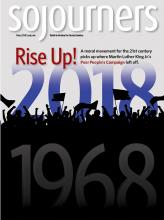THE LONG-OVERDUE transition of power in South Africa this winter, from President Jacob Zuma to Cyril Ramaphosa, has sparked a resurgence of hope among younger church activists in the country. Zuma’s nine years in office were catastrophic to South Africa’s politics and social fabric through entrenched corruption and state capture. Zuma and his cronies enriched themselves while the economy stumbled, with unemployment now above 27 percent and schools and health care in an increasing state of crisis.
While Ramaphosa’s election by the National Assembly has inspired hope, an awakening less heralded and potentially more significant long term has been taking place across the church in South Africa. The theology of hope and liberation that helped fuel the anti-apartheid struggle played a formative role in shaping the public theology of many in the U.S. and around the world. Now a new generation of South African Christian activists is on the cutting edge of social transformation.
In the aftermath of Zuma’s resignation, a handful of these leaders addressed the catalytic role the church has played in shifting the political winds in South Africa and their hope for the future.
Read the Full Article

